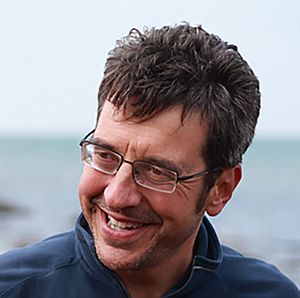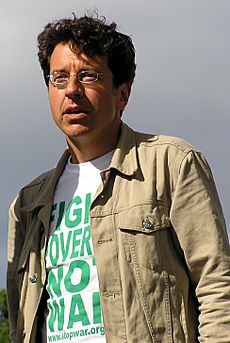George Monbiot facts for kids
Quick facts for kids
George Monbiot
|
|
|---|---|

Monbiot in 2013
|
|
| Born | 27 January 1963 London, England
|
| Alma mater | Brasenose College, Oxford |
| Occupation | Journalist |
| Spouse(s) |
Angharad Penrhyn Jones
(m. 2006; div. 2010) |
| Children | 2 |
| Awards | United Nations Global 500 Award (1995) |
George Monbiot, born on January 27, 1963, is a writer and activist from England. He is known for his work on environmental issues and politics. He writes a regular column for The Guardian newspaper and has written many books.
Monbiot grew up in Oxfordshire and studied zoology at the University of Oxford. He started his career as an investigative journalist, writing his first book Poisoned Arrows in 1989. This book was about human rights in West Papua. Later, he became involved in activism for topics like climate change and loneliness. In his 2013 book Feral, he talked about and supported expanding rewilding efforts.
He also started The Land is Ours, a group that campaigns for people to have the right to access the countryside and its resources in the United Kingdom. Monbiot received the Global 500 award in 1995 and the Orwell Prize in 2022.
Contents
Early life and education
George Monbiot was born in Kensington, London. He grew up in Rotherfield Peppard, a village in Oxfordshire. His father, Raymond Monbiot, was a businessman. His mother, Rosalie, was a local politician.
He went to Elstree School and then Stowe School in Buckinghamshire. He earned a scholarship to Brasenose College, Oxford. Monbiot has said that reading a book called Paolo and Panetto by Bettina Ehrlich when he was young helped him start thinking about politics.
Career
After finishing his degree in zoology, Monbiot worked for the BBC Natural History Unit. He produced radio shows about nature and the environment. He then moved to the BBC's World Service for a short time before leaving to write his first book.
As an investigative journalist, he traveled to places like Indonesia, Brazil, and East Africa. Because of his work, he was not allowed in seven countries. He was even sentenced to life in prison in Indonesia, though he was not there for the trial. During his travels, he faced many dangers, including being shot at and arrested. He returned to Britain after getting very sick with cerebral malaria in Kenya.
Monbiot joined the British roads protest movement. He often spoke to the press about these protests. He was injured during one protest, which led to him being hospitalized. Later, he became a visiting fellow at Green College, Oxford.
In 2014, Monbiot wrote an article about loneliness. This led him to work with musician Ewan McLennan. They released an album together called Breaking the Spell of Loneliness in October 2016. They also went on a tour across the UK.
Monbiot narrated a video called How Wolves Change Rivers. This video was based on his TED talk from 2013. It was about how ecosystems and landscapes can be restored, especially through rewilding, like when wolves were brought back to Yellowstone Park. In 2019, Monbiot worked with Greta Thunberg on a video called Nature Now, which was about natural ways to fight climate change.
He also appeared in the 2021 Netflix documentary Seaspiracy. This film looks at how humans affect ocean life and fishing. Monbiot defended the film from its critics. In 2021, Monbiot created a live documentary called Rivercide. It showed the poor condition of rivers in the UK, especially the River Wye.
In early 2022, Monbiot talked about the film Don't Look Up. He explained how hard it is to campaign for Earth's protection when there is so much inaction. In 2024, Monbiot was in the British documentary film I Could Never Go Vegan.
Views and activism
Climate change
Monbiot believes that strong action and political will are needed to fight global warming. He supports making "ecocide" a crime that can be judged by the International Criminal Court. He thinks this would make a big difference, forcing people to think twice before causing large-scale environmental damage.
To reduce his own impact on the environment, he has become a vegan. He also encourages other people to try a vegan lifestyle.
Media
Monbiot has criticized how the media, especially the BBC, covers climate change and environmental issues. He has also said the BBC has a political bias.
Politics
Monbiot is a critic of neoliberalism, which is an economic idea that supports free markets and less government involvement. In January 2004, Monbiot helped start a political group called Respect – The Unity Coalition. He left the group the next year.
In September 2009, Monbiot said he supported the policies of Plaid Cymru, a political party in Wales. In April 2010, he signed a letter supporting the Liberal Democrats. Before the May 2015 general election, he supported Caroline Lucas from the Green Party. He also supported the Green Party in general. In August 2015, Monbiot supported Jeremy Corbyn in the Labour Party leadership election. In April 2017, he said he would vote for the Labour Party in the 2017 general election.
Monbiot has warned that Britain is at risk of becoming a failed state. He supports Scottish independence, Welsh independence, and Irish reunification. In February 2021, he said on BBC Two's Politics Live that if he lived in Scotland, Wales, or Northern Ireland, he would want to leave the United Kingdom.
Monbiot has also criticized some other activists, saying that a "cult" has formed around them, making it hard for people to believe they could be wrong.
Nuclear energy
Monbiot used to be strongly against the nuclear industry. However, in March 2011, he changed his mind. He now supports using nuclear power. He was convinced of its safety after seeing the limited effects of the 2011 Japan tsunami on nuclear reactors. He has since criticized the anti-nuclear movement, saying it has given wrong information about how radiation affects human health.
In October 2013, Monbiot criticized the choice of a specific reactor design for the Hinkley Point C nuclear power station. He pointed out the high cost and the need for uranium mining and waste production for 50 years. He compared this to other reactor ideas, like "integral fast reactors" and "thorium reactors." He said these could use existing nuclear waste or a byproduct of other mining, solving problems of energy supply, nuclear waste, and climate change at the same time.
Published works
Monbiot's first book was Poisoned Arrows (1989). It was about a program that moved people in West Papua. His next book was Amazon Watershed (1991), which described how Brazilian farmers were forced off their land. His third book, No Man's Land: An Investigative Journey Through Kenya and Tanzania (1994), was about land being taken from nomadic people in Kenya and Tanzania.
In 2000, he published Captive State: The Corporate Takeover of Britain. In this book, Monbiot argues that big companies in the United Kingdom are a serious threat to democracy. His fifth book, The Age of Consent: A Manifesto for a New World Order, came out in 2003. This book tried to offer positive ideas for change for the global justice movement.
Monbiot's book Heat: How to Stop the Planet Burning, published in 2006, focused on climate change. Feral: Searching for Enchantment on the Frontiers of Rewilding was published in 2013. It focuses on the idea of rewilding the planet. In the book, Monbiot criticizes sheep farming. The book received good reviews and won the Society of Biology Book Award in 2014. Monbiot's 2022 book Regenesis looks at how farming affects the environment and suggests sustainable approaches.
The Invisible Doctrine: The Secret History of Neoliberalism (& How It Came to Control Your Life), published in 2024, was written by Monbiot and Peter Hutchison. A film with the same name is also planned.
Monbiot writes a weekly column for The Guardian. His columns cover many topics, focusing on political ideas related to environmental and social problems, especially in the United Kingdom.
Personal life
Monbiot has mostly lived in Oxford. For a few years starting in 2007, he lived in a low emissions house in Machynlleth, Wales, with his then-wife, Angharad Penrhyn Jones, and their daughter. He moved back to Oxford by 2012 because his new partner lived there. Their daughter, Monbiot's second child, was born in early 2012. In 2022, he moved to South Devon.
Awards
In 1995, Nelson Mandela gave him a United Nations Global 500 Award for his great environmental work. He won the Sir Peter Kent award in 1991 for his book Amazon Watershed. In November 2007, his book Heat won an Italian book prize called Premio Mazotti. However, he did not accept the money that came with the prize because he did not want to fly to Venice to collect it, saying it was not a good enough reason to fly. In 2017, he received the SEAL Environmental Journalism Award for his work at The Guardian.
In 2022, Monbiot was given The Orwell Prize for Journalism.
Selected works
- (1989). Poisoned Arrows: An investigative journey through the forbidden lands of West Papua.
- (1991). Amazon Watershed: The new environmental investigation.
- (1994). No Man's Land: An Investigative Journey Through Kenya and Tanzania.
- (2000). Captive State: The Corporate Takeover of Britain.
- (2003). The Age of Consent.
- (2006). Heat: How to Stop the Planet Burning.
- (2013). Feral: Searching for Enchantment on the Frontiers of Rewilding.
- (2016). How Did We Get into This Mess?: Politics, Equality, Nature.
- (2017). Out of the Wreckage: A New Politics for an Age of Crisis.
- (2022). Regenesis: Feeding the World without Devouring the Planet.
- (2024). The Invisible Doctrine: The Secret History of Neoliberalism (& How It Came to Control Your Life).
See also
 In Spanish: George Monbiot para niños
In Spanish: George Monbiot para niños


